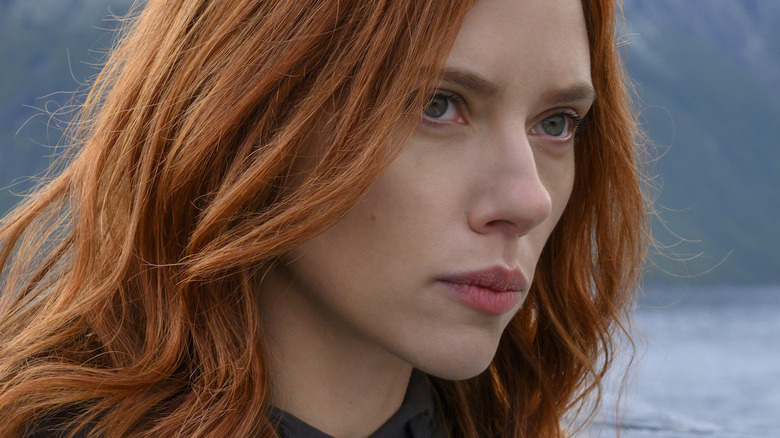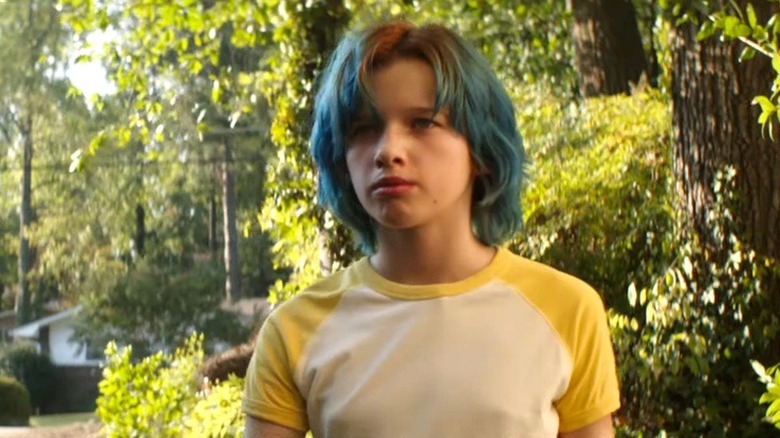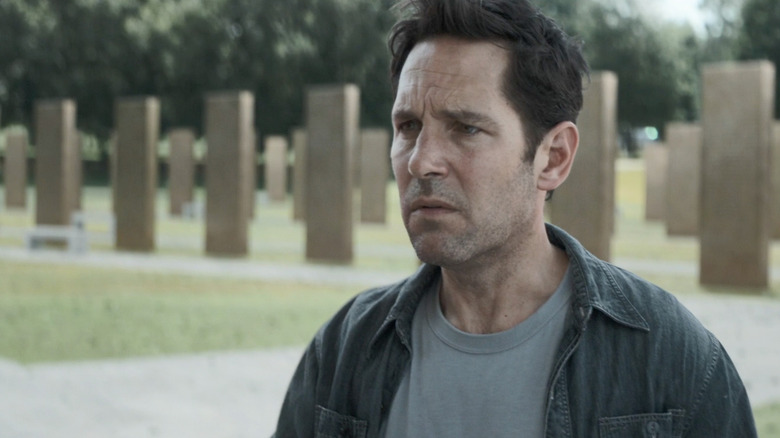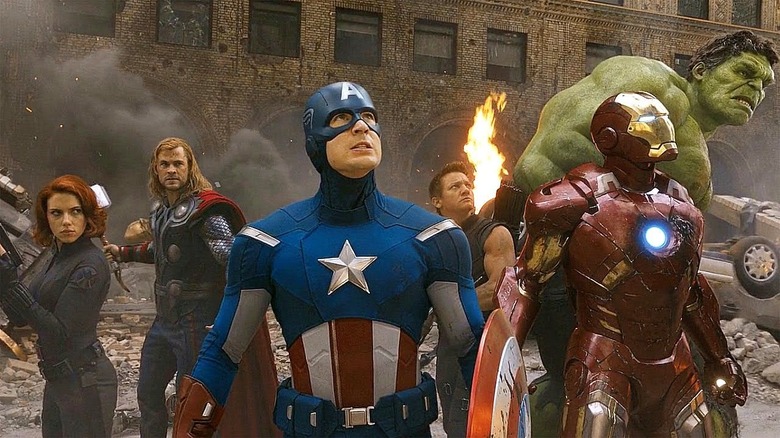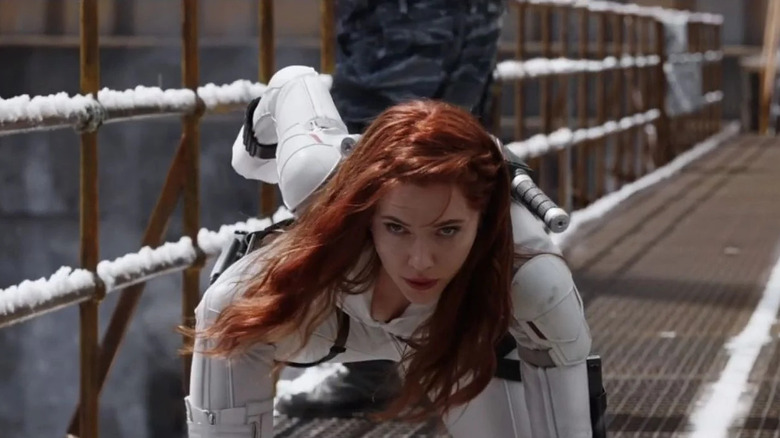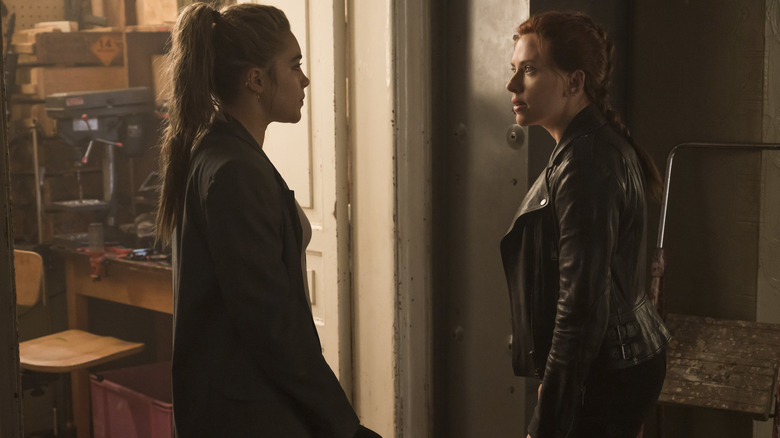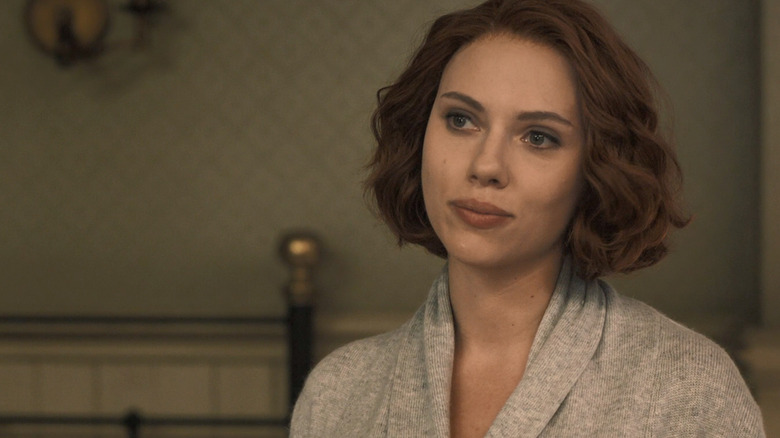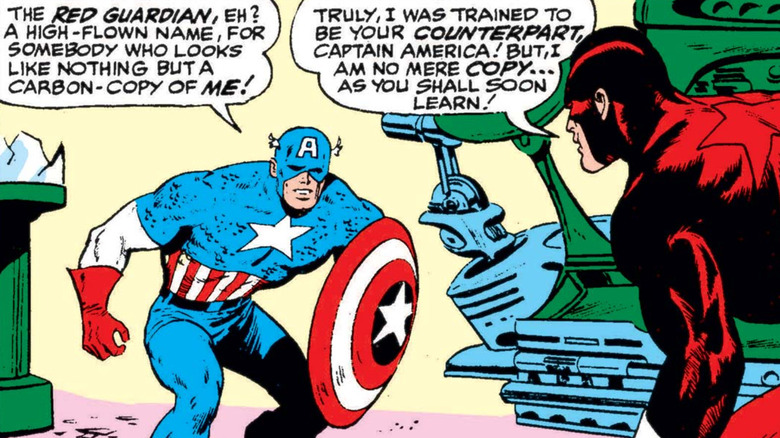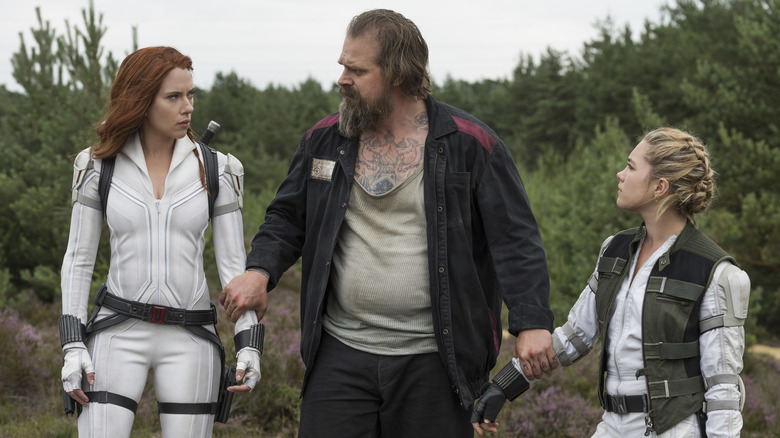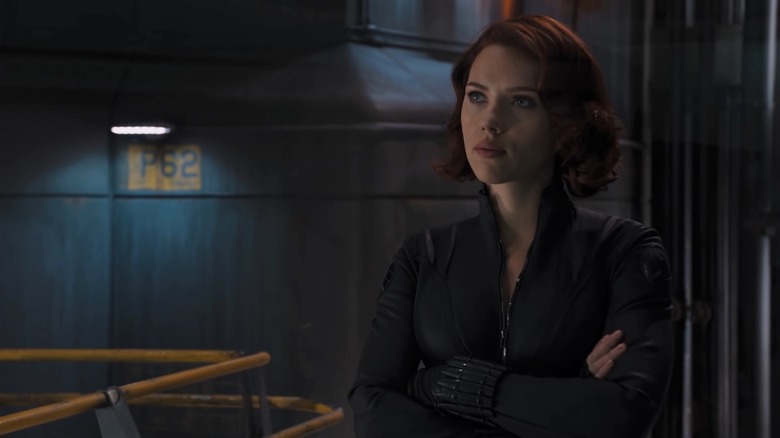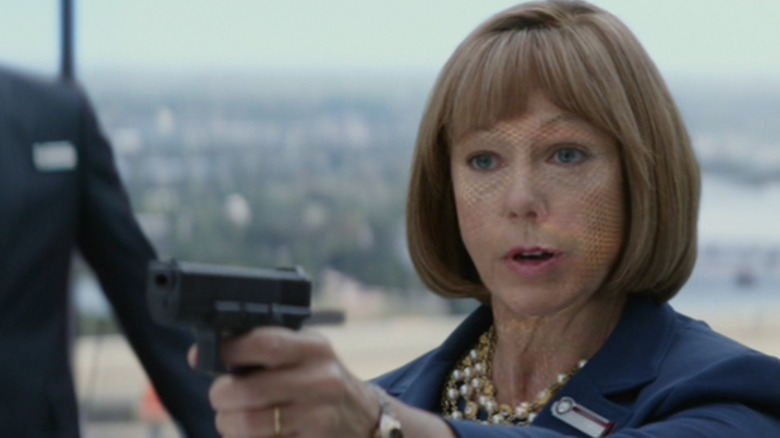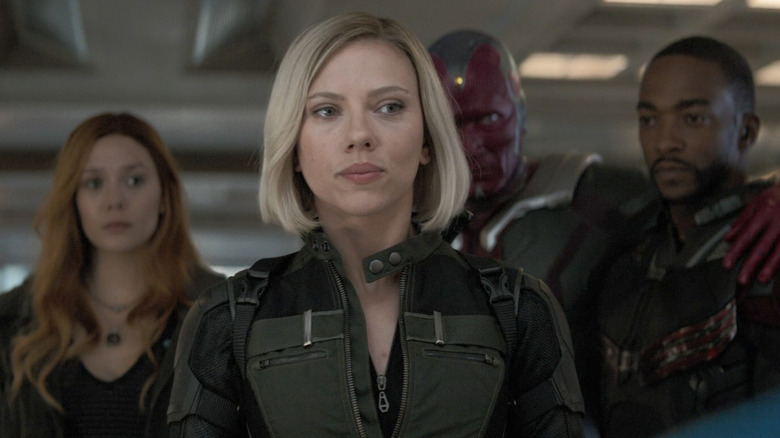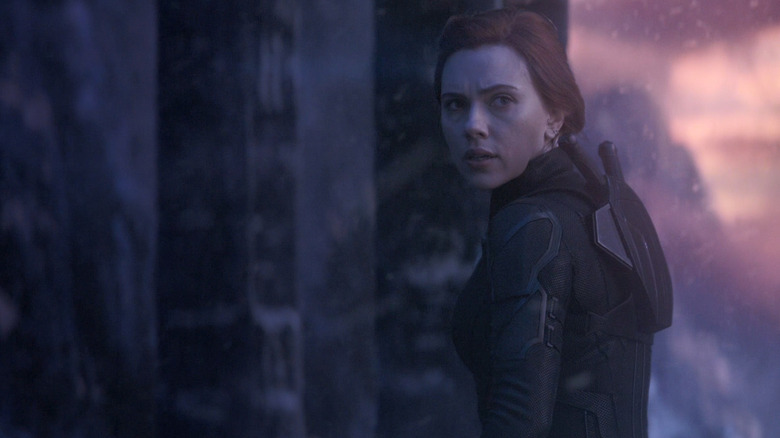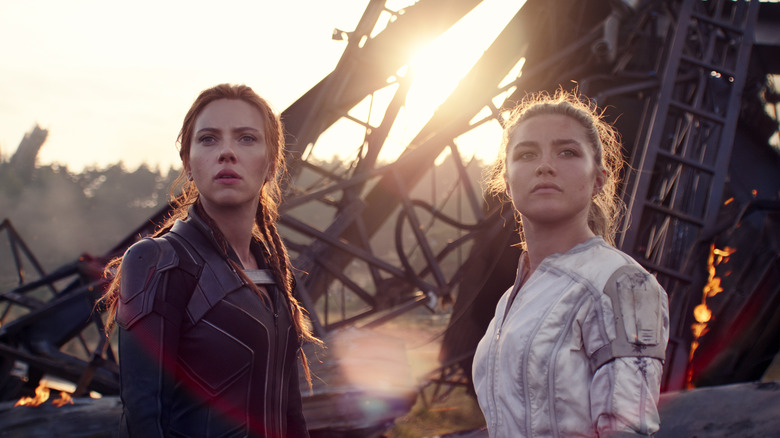Lines In Black Widow That Are More Important Than You Realized
Directed by Cate Shortland, "Black Widow" is the 24th feature film in the ever-growing Marvel Cinematic Universe. Set between "Captain America: Civil War" and "Avengers: Infinity War," this spy thriller finds Natasha Romanoff joining up with her dysfunctional "family" in an attempt to take down an old enemy and free her fellow Widows from the infamous Red Room. And along with establishing new superheroes and shedding more light on the red-headed Avenger, "Black Widow" features numerous lines of dialogue that take on new meaning when you consider how they fit into the previously established lore of the MCU.
Of course, it's perfectly understandable if you didn't watch the movie with a pad and pencil in hand, carefully writing down and analyzing every single line for its broader MCU significance. So, we went ahead and did it for you! Of course, that means we're discussing massive spoilers for the entire film, so be warned — if you haven't seen the movie yet, you should probably stop reading. And if you learn something you don't want to, you're not allowed to send assassins after us. However, if you're ready for a deep dive into the world of Marvel spies and Eastern European action, then get ready for all the lines in "Black Widow" that are more important than you realized.
Black Widow really did start that young
One thing you'll quickly realize as we start moving through this list is that several of these lines are callbacks to one film in particular, 2012's "The Avengers," the movie that proved beyond a shadow of a doubt that Marvel, unlike any other studio in history, could faithfully convert the feeling of comic books to the big screen. But "The Avengers" isn't just a wild ensemble celebration –- it's also the closest thing we ever got to a Black Widow showcase movie (until now, of course). "The Avengers" is the film that lays the foundation for all future Natasha Romanoff character work, and "Black Widow" wastes little time picking up those threads.
Consider, for instance, Natasha's first encounter with Bruce Banner in "The Avengers," when he's tricked into meeting with her by a small, deceptive little girl. "And your actress buddy, is she a spy too?" Bruce asks Natasha. "They start that young?" Natasha replies, "I did." And indeed, when the opening sequence of "Black Widow" flashes back to Natasha's childhood and her objection to the Red Room taking Yelena into training because "she's only six," her surrogate father reminds her, "You were even younger."
No respect on Scott Lang's name
"Black Widow" takes place in the immediate aftermath of 2016's "Captain America: Civil War," which sees the heroes who fought alongside Steve Rogers –- Hawkeye, Falcon, Scarlet Witch, and Ant-Man –- imprisoned by the U.S. government, which is represented by Secretary of State Thaddeus Ross. It also sees Black Widow switch sides mid-film, ultimately coming around to Steve's point of view. So it makes sense that "Black Widow" shows us the fallout from that decision, with Ross coming to arrest Natasha. "We got Barton, we got Wilson," Ross tells her, "and the other guy, the incredible shrinking convict."
The line is just the latest in a running gag where nobody in the Avengers knows who Scott Lang is or remembers his name. When he tries to verbally spar with Tony Stark from his prison cell in "Civil War," Stark walks right past him with a perfunctory "who are you?" When Lang returns from the quantum realm in "Avengers: Endgame," he has to remind them that he "was the guy that got really big," and later, he's dismissively referred to by three successive heroes as "humie," "idiot," and "regular-sized man." And of course, Lang's tumultuous relationship with his own moniker is symbolically driven home earlier in that same film, when he finds his name inscribed on a monument to victims of the Snap.
The big ones
While some lines in "Black Widow" reference events that take place within this fictional universe, others speak more directly to the all-consuming meta-narrative surrounding the film — namely, the fact that despite being an incredibly popular character and an original member of the on-screen Avengers, it took more than 10 years for Black Widow to get her own solo movie. And by the time it finally happened, she was already dead.
To its credit, the script leans into this persistent injustice instead of pretending it never happened, a choice that starts when Yelena tells Natasha why the master of the Red Room, General Dreykov, never came after Natasha despite the fact that he escaped death at her hands. "I mean, the clue is in the name," Yelena says. "Dreykov kills you, one of the big ones comes to avenge you." This brings Natasha up short for a moment. "Wait," she asks, "what are 'the big ones?'" At which point Yelena, naturally, brings up "the god from space."
This exchange can be read as a reference to Tony Stark's "if we can't protect the Earth, you can be damned sure we'll avenge it" line from "The Avengers" or to the Hulk's informal nickname, "the Big Guy," which is part of the lullaby Natasha uses to calm him down in "Avengers: Age of Ultron." But mainly, it's a reference to the fact that Black Widow has always been treated as secondary to her male companions.
That thing you do
Almost immediately after their conversation about "the big ones," Natasha and Yelena switch to another meta-conversation, this time regarding Natasha's signature pose. "Why do you always do that thing?" Yelena asks. When Natasha asks what thing she's talking about, Yelena is more than happy to physically demonstrate. "That thing you do when you're fighting, like this thing that you do when you whip your hair when you're fighting, with the arm and the hair and you do, like, a fighting pose," she says, doing her best mocking version of the pose that Natasha pulled out in her 2010 debut appearance, "Iron Man 2," and has been doing ever since.
Again, the commentary here is about Black Widow's image in popular culture and the fact that, rather than choosing to explore her character in any depth, the MCU had mostly been interested in her as a physical object up to this point. And yet, despite that, people really do love the Black Widow character, and the stuff she does on the silver screen –- including the pose –- are objectively cool. By the end of the film, Yelena acknowledges this, and in a way, by accepting the pose (or at least trying it out), she also accepts her own future role as the new Black Widow.
Killer or hero?
After two consecutive exchanges between the Black Widow sisters filled with extremely meta subtext, their conversation turns (as it so often does with superhero assassins) to the difference between a killer and a hero. While Natasha insists that she's left behind the former and embraced the latter, Yelena argues that Natasha's popularity doesn't wash the blood off her hands and her celebrity doesn't make her better than Yelena. "I'm not the killer that little girls call their hero," she says, putting a cap on the larger narrative commentary infusing the entire scene.
These are questions that the Black Widow character has grappled with since the beginning. Can an assassin be a hero? What does it say that the Black Widow really is a celebrity character, beloved of young girls around the world despite her background and the sins of her past? What does it say that Marvel, until recently, didn't seem interested in giving those girls anyone else to idolize? This isn't the first time that "Black Widow" cuts directly to the central conflict that inhabits both the character of Natasha Romanoff and that character's place in the cultural landscape, but it is perhaps the most profound –- especially since, now that she's taken Natasha's place, Yelena will likely be forced to answer the same questions in a dramatically different context.
Child's play
Prior to "Black Widow," the most we ever saw of Natasha's inner conflict came during an infamous scene in "Avengers: Age of Ultron," the one where she tells Bruce Banner that she can't have children. "It makes everything easier," Natasha says. "Even killing. You still think you're the only monster on the team?"
At the time, this line caused a storm of controversy from people who thought the script was equating the inability to have children with monstrousness. And "Black Widow" leans into the incident, having Yelena bring up the forced sterilization in a moment of dark humor, as well as directly asking Natasha at one point if she ever wished for kids. There's even another nod to the unnamed Bruce, when Yelena tells Natasha about a fictional version of their life in which Black Widow's imaginary husband "renovates houses." "That is not my story," Natasha replies, doubtless thinking that her sort destroys houses instead of repairing them.
Deliberately reminding the audience of the "Age of Ultron" controversy might seem like a misstep, but the "Black Widow" narrative makes it clear that, regardless of the absence of reproductive organs, Natasha and Yelena are far from monsters. Natasha never answers the question about wishing for kids, but Yelena's own answer is perfectly instructive: "I want a dog."
More like a contemporary
After spending so much time in deep emotional and sociological territory, it's little wonder that "Black Widow" decides to eventually pivot in a more light-hearted and action-packed direction. Enter Alexei Shostakov, Black Widow's symbolic father, formerly a Russian superhero called the Red Guardian. We met his younger self in the opening scene set in 1995, but when we catch up with him in the modern day, he's in prison, using his super strength to beat people at arm-wrestling and bragging about having done battle with Captain America in the 1980s. After Natasha and Yelena break him out, he asks Natasha if Cap had ever mentioned him in war stories, calling him, "My great adversary in this theater of geopolitical conflict; not so much a nemesis, more like a contemporary, you know? Co-equal. I always thought there was a great deal of mutual respect."
While it's true that, as one prisoner points out before Alexei breaks his arm, Captain America was frozen in ice from 1945 to 2011, Alexei's story might not be as far-fetched as it seems. In the comics, Red Guardian really did fight Captain America and really did earn his respect (by dying to save him). And considering the MCU's wonky time-travel mechanics resulted in Cap going permanently back in time to experience the years he missed, it's entirely possible that a battle with Alexei in the 1980s really did take place.
Red in my ledger
After interrogating Natasha about whether or not Captain American ever talks about him, Alexei's conversation with his daughters takes a different course. While the two women see him as having committed unforgivable wrongs against them, Alexei openly takes pride in helping them become what they are –- two of the world's deadliest assassins. Totally incapable of taking a hint, he embraces Natasha and Yelena, telling them, "Your ledgers must be dripping, just gushing red!"
As any MCU fan worthy of the title will remember, this line is a direct reference to one spoken by Loki in "The Avengers," when Natasha visits him in his cell, ostensibly to bargain for the life of Clint Barton, who's under Loki's control. The reason for this, Natasha claims, is she owes Barton a debt. "I got red in my ledger," she says. "I'd like to wipe it out." Loki responds by revealing that Barton told him all about Natasha's murderous past — including a reference to "Dreykov's daughter," which finally pays off in "Black Widow," along with the references to Budapest –- and knows just how much she has to account for. "Your ledger is dripping," he says. "It's gushing red!" Honestly, the reference is so on-the-nose that it doesn't really work, but we can't imagine how jarring it must've been for Natasha to hear it.
Thank you for your cooperation
A satisfying callback to Natasha's scene with Loki in "The Avengers" comes later in "Black Widow," after she's confronted General Dreykov in the Red Room's command center. In the "Avengers" scene, Natasha seems shaken by Loki's knowledge of her, but the scene culminates in her suddenly regaining her composure when the God of Mischief accidentally gives away his plan. It's immediately clear that, while Loki's words did have an impact, Natasha's stricken reaction and dramatic pronouncement of "you're a monster" was all for show, a scheme to trick Loki into revealing his intentions. "Thank you for your cooperation," she tells him before leaving to give her team the information.
The scene in "Black Widow" that sees Natasha pretend to be helpless against Dreykov is also reminiscent of her "Avengers" introduction, in which she pretends to be helpless against a group of Russian arms dealers, only there are much higher stakes this time around. And in this case, the narrative does an excellent job of convincing viewers that Dreykov really does have power over Natasha ... until her repetition of the line "thank you for your cooperation" kicks off the reveal that, once again, she's actually been in control of the situation the entire time.
The masks we wear
It should be noted that by the time Natasha is ready to reveal her master plan to Dreykov, we have good reason to believe she's in over her head. Not only is she unable to harm Dreykov in any way due to chemically engineered pheromones, but her defiance leads to him punching her in the face several times before diving into the villainous monologue required of all superhero films. (It turns out, of course, that Natasha knew about the pheromones and was bypassing them by being punched in the nose.) But before that, there's the matter of the masks –- the photostatic veils that Natasha and her mother, Melina, use to disguise themselves as one another. But Dreykov sees through the ruse, saying, "When you look into the eyes of a child you have raised, no mask in the world can hide that."
The photostatic veil is directly associated with Black Widow since she's the one who first used it in the climax to "Captain America: The Winter Soldier." But the MCU has gotten considerable mileage out of the concept since then, most notably in the ABC spinoff show "Agents of SHIELD," which centers a major Season 2 character and storyline around the technology. More recently, it was used by Sharon Carter in her efforts to infiltrate the Global Repatriation Council crisis zone in "The Falcon and the Winter Soldier."
It has pockets
One thing we never thought we'd need the backstory for is the vest that Natasha wears in "Avengers: Infinity War," but "Black Widow" gave it to us anyway.
As it turns out, the vest initially belonged to Yelena. It was the first thing she bought for herself after being freed from Dreykov's mind control, and she's understandably invested in Natasha acknowledging how cool it is. (Yelena being as excited as she is about the vest having pockets is reminiscent of the legendary "hair tie" moment in the 2020 superhero film "Bird of Prey," in the sense that it reminds you in a delightfully subversive way that this movie was directed by a woman). When Natasha leaves her found family behind at the end of "Black Widow," Yelena gives her the vest to take with her, saying, "I guess you should take this, I know how much you like it."
It's a small, sweet gesture that makes Natasha's costume in "Infinity War" retroactively poignant. Also, it's just a really great vest. With pockets.
Natasha's farewell
If there's any one line in "Black Widow" that hits you right in the gut, it's the moment when Melina tells Natasha, just before they separate, "You take care of yourself, okay?" "Don't worry," Natasha responds. "I got this." Melina replies, "I know."
Sadly, we have no reason to think that Natasha ever saw any members of her adopted family again. It's possible that future MCU installments will reveal that they met up a few times in the couple of years between "Black Widow" and "Infinity War," and maybe again if Melina, Yelena, or Alexei survived the Snap ... but we don't know for sure. And it seems unlikely that Natasha had a ton of free time while going on the lam with Steve Rogers and running the Avengers. Seeing her restore her bonds with her old family while knowing her ultimate fate is legitimately difficult to watch, especially since Natasha actively chose to sacrifice her life in "Endgame." The story of four loved ones reuniting is still heartwarming, but we still wish they had more time together.
Black Widow's two families
Like almost every installment in the MCU, "Black Widow" is a movie about found family, and the narrative is relentless in driving home that theme, as the reforming of Natasha's dysfunctional secret agent family helps her change her attitude toward the Avengers. She goes from accepting their dissolution and embracing solitude at the beginning of the film to re-committing to put them back together by the end. "It's funny," she tells Rick Mason in the final scene. "My whole life, I didn't think I had any family. Turns out I got two, so ... one of them is a bit of a mess right now. I'm gonna go break a few of them out of prison, see if I can't help patch things up."
And she does. Her sacrifice, along with Tony Stark's, ultimately restores the family that is the Avengers. If we assume, as some have, that her Russian family got Snapped, her sacrifice restores them as well. In this regard, though it comes years too late, "Black Widow" is the perfect celebration of the character of Natasha Romanoff –- the assassin who died for the people she loved.
